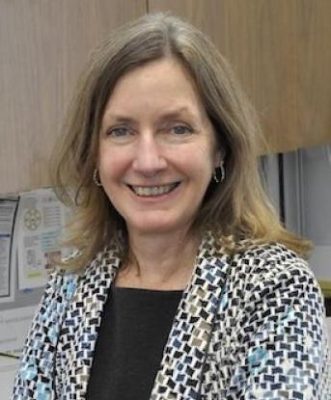In the Reflections series, the School of Education asks alumni to look back on their distinguished and fascinating lives and careers.
Katherine Beissner G’91 was named Dean of the College of Health Professions at Upstate Medical University, Syracuse, NY, in 2017 and a fellow of the Association of Schools Advancing Health Professions in 2023, in recognition of her contributions to health professions as an administrator, researcher, and educator.
 Beissner joined the College of Health Professions in 2015, first serving as Chair of the Department of Physical Therapy and Interim Dean before being tapped to lead the college. Earlier in her career, she served at Ithaca College’s Department of Physical Therapy, where she was named Interim Associate Dean of the School of Health Sciences and Human Performance.
Beissner joined the College of Health Professions in 2015, first serving as Chair of the Department of Physical Therapy and Interim Dean before being tapped to lead the college. Earlier in her career, she served at Ithaca College’s Department of Physical Therapy, where she was named Interim Associate Dean of the School of Health Sciences and Human Performance.
Holding a Ph.D. in Instructional Design, Development, and Evaluation (IDDE) from Syracuse University School of Education, a master’s degree from Texas Woman’s University, and a bachelor’s degree from the University of Texas Health Science Center, Beissner’s research and publications address pain management and impairment in the older population, home health care, pain neuroscience education, and equity, diversity, and inclusion in the health care industry.
At Upstate Medical University, Beissner helped develop Jump Into Healthcare, a summer program that introduces high school and college students to health care professions through immersive experiences and that seeks to diversify the profession’s workforce.
What is your fondest memory from your time at Syracuse University/School of Education?
A group of IDDE graduate students and faculty participated in a retreat with students and faculty from other institutions. I remember that it was a very long road trip to Bloomington, IN, a luxury in my busy life, and I valued the extended time with our amazing faculty.
At the retreat we met David Jonassen, who was based at University of Colorado-Denver at the time. His work centered on constructivist learning theories and the graphic representations of knowledge. I was particularly interested in using the construction of these graphics to deepen learning. We continued to explore this area, it formed the basis of my dissertation, and eventually led to a book on the topic, with Dr. Jonassen and fellow student Michael Yacci: Structural Knowledge (Lawrence Erlbaum, 1993).
What is something from your career that you are most proud about?
There is a huge shortage of health care providers, and while the focus has been on the nursing and physician shortage, there are needs on the other health professions as well. Alongside the shortage we have, the fact that health care workforce does not reflect the diversity of the US population contributes to racial and ethnic disparities in health outcomes.
These issues have led to my interest in developing a way to expose and excite a diverse group of learners to this large range of health careers. This led me to develop a problem-based program called Jump Into Health Care, with the intent to offer the program to high school or early college students from historically underrepresented groups.
Complex patient cases are used to guide students through the clinical reasoning process used by health care providers to determine the diagnosis and treatment options. Along the way students learn about diagnostic tests such as medical imagining and laboratory science and treatment techniques administered by respiratory therapists, behavior analysts, and other members of the health care team. Hands-on learning in our laboratories provide additional excitement about possible careers they had never thought about. It is wonderful to see young minds open to the possibilities of these rewarding careers that are in great demand in Syracuse.
What is the biggest change you have seen in education during your lifetime?
Without a doubt, the advances in technology and information science have been amazing. When I wrote my master’s thesis I used huge (and heavy) volumes of Index Medicus to find relevant sources, as well as microfiche to access journal articles. Now we have almost instantaneous access to information and a vastly expanded range of journals and other information sources.
What gives you hope?
Interestingly, at this moment artificial intelligence gives me immense hope. If we can figure out how to harness the potential of AI while retaining human connectedness and morality, there is great potential to make this world a better place.
What advice do you have for an SOE student just starting on their career path?
Look for opportunities to stretch yourself, whether through elective coursework outside your main area of interest, attending conferences, or writing papers with your faculty.
